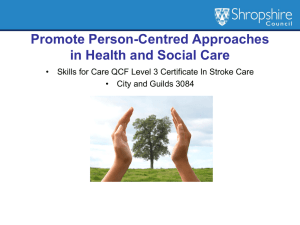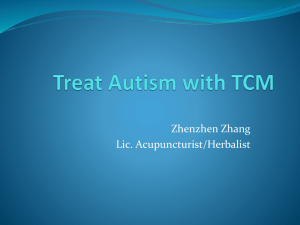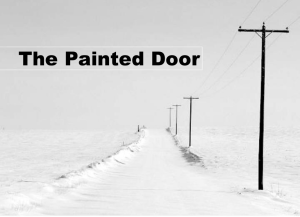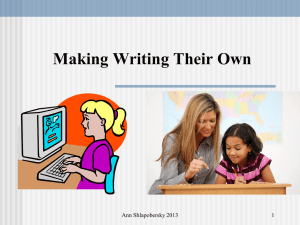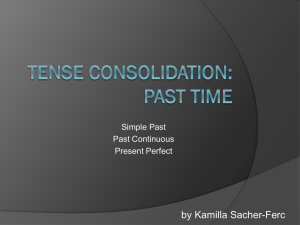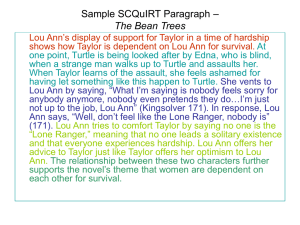This is Ann.
advertisement
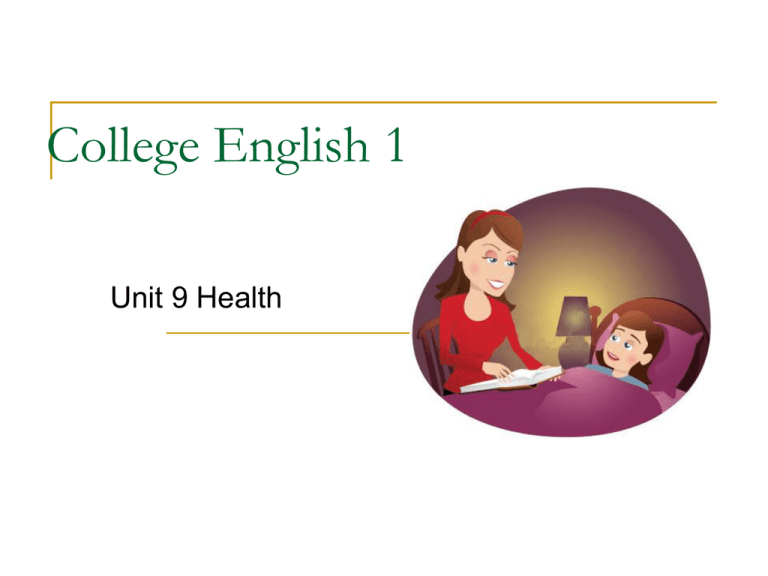
College English 1 Unit 9 Health Outline Text A Conversation: Is it an Emergency? Text B Eastern and Western Medical Systems Exercises Text A Conversation: Is it an Emergency? emergent: adj. Suddenly come into being or notice an emergent engineering project 紧急 的 emergency: n. 紧急情况,急诊 How would disabled people escape in an emergency? national emergency 全国紧急状态 emergency case 急诊病人 Conversation Ann needs to see her doctor for an emergent case. So she calls the clinic to make an appointment. Later on, she goes to the clinic. Receptionist: Dr. Lee’s Clinic. Ann: May I speak to Dr. Lee? Receptionist: Dr. Lee is engaged for the moment. Who’s speaking? Ann: This is Ann. I’d like to make an appointment to see Dr. Lee. Receptionist: Is it an emergency? Ann: Yes, I have an infected wound. Receptionist: In that case, how about this afternoon at two? Ann: Fine. (A little later, Ann arrives at the clinic.) Ann: I’m here to see Dr. Lee. Receptionist: Your name? Ann: Ann. Receptionist: Ah, yes. Please fill out this form, with your name, address, and phone number. Do you have health insurance? Ann: Yes. Receptionist: OK. Stay here. Dr. Lee will be right with you. (A moment later) Dr. Lee: What seems to be the problem? Ann: Well, I cut myself with a sharp knife the other day, and now my hand is swollen. It seems to be infected. Dr. Lee: When did it happen? Ann: Last Saturday. Dr. Lee: Could you roll up your sleeve? Does it hurt when I press here? Ann: A little bit. Dr. Lee: Have you been taking any medication? Ann: No. Dr. Lee: Do you have a fever? Ann: No, I don’t think so. Dr. Lee: I’ll give you a prescription that’ll get rid of the infection quickly. Ann: Thank you, Doctor. Conversation Ann needs to see her doctor for an emergent case. So she calls the clinic to make an appointment. Later on, she goes to the clinic. So she calls the clinic to make an appointment. clinic: n. a building, often part of a hospital, to which people can go for medical care or advice relating to a particular condition 诊所,门诊部 Bring your baby to the clinic and we'll take a look at her. Antenatal clinics provide care for pregnant women. Make an appointment 和某人约会/预约 Later on 后来 What are you doing later on this evening? Later on, we could go and have a meal if you like. 比较: earlier on 先前,早期 She developed a musical interest earlier on. 她在 早年就对音乐产生了兴趣。 翻译 Ann needs to see her doctor for an emergent case. So she calls the clinic to make an appointment. Later on, she goes to the clinic. 安因为一个急症要看医生,于是她打电话给诊 所预约。稍后她就去了诊所。 Receptionist: Dr. Lee’s Clinic. Ann: May I speak to Dr. Lee? Receptionist: Dr. Lee is engaged for the moment. Who’s speaking? Ann: This is Ann. I’d like to make an appointment to see Dr. Lee. Conversation skills: making a phone call Ann: May I speak to Dr. Lee? Receptionist: Dr. Lee is engaged for the moment. Who’s speaking? Ann: This is Ann. Dr. Lee is engaged for the moment. engaged: adj. busy doing something I'd come to the meeting on Tuesday but I'm afraid I'm otherwise engaged (= doing something else) . He is engaged in devising the project. for the moment: 目前,暂时 I think perhaps we might leave it for the moment. 我看或许我们可以暂时不谈这事。 I’d like to make an appointment to see Dr. Lee. I’d like to表示意愿 make an appointment with sb. to do sth. 约会/ 预约某人做某事 see a doctor 看医生,看病 It would be good for you to see a doctor. 翻译 Receptionist: Dr. Lee’s Clinic. Ann: May I speak to Dr. Lee? Receptionist: Dr. Lee is engaged for the moment. Who’s speaking? Ann: This is Ann. I’d like to make an appointment to see Dr. Lee. 接待员:李医生诊所。 安:我能跟李医生通话吗? 接待员:李医生现在没有空。请问您是哪位? 安:这是安,我想预约李医生。 Receptionist: Is it an emergency? Ann: Yes, I have an infected wound. Receptionist: In that case, how about this afternoon at two? Ann: Fine. (A little later, Ann arrives at the clinic.) I have an infected wound.伤口发炎 Infected: adj. containing bacteria, dirt or other things that can cause disease 发炎的,感染的 e.g. an infected wound/cut After the operation the wound became infected. The ward was full of children infected with TB. Wound: n. a damaged area of the body, such as a cut or hole in the skin or flesh made by a weapon a gunshot wound In that case, how about this afternoon at two? In that case: in this situation I wouldn't normally agree but I'll make an exception in this case. Jobs are hard to find but in his case that's not the problem because he has so much experience. Conversation:how about…提出建议 --How about this afternoon at two? --Fine. 翻译 Receptionist: Is it an emergency? Ann: Yes, I have an infected wound. Receptionist: In that case, how about this afternoon at two? Ann: Fine. (A little later, Ann arrives at the clinic.) 接待员:是急诊吗? 安:对,我有个伤口感染了。 接待员:这样的话,今天下午两点如何? 安:好的。(稍迟,安来到诊所。) Ann: I’m here to see Dr. Lee. Receptionist: Your name? Ann: Ann. I’m here to see Dr. Lee. be here:到这里,在这里 e.g. He’s here already. He has been here in London for many years. 他 已在伦敦呆了很多年了。 to do sth.表示目的状语 翻译 Ann: I’m here to see Dr. Lee. Receptionist: Your name? Ann: Ann. 安:我来看李医生。 接待员:你的名字是? 安:安. Receptionist: Ah, yes. Please fill out this form, with your name, address, and phone number. Do you have health insurance? Ann: Yes. Receptionist: OK. Stay here. Dr. Lee will be right with you. (A moment later) Please fill out this form, with… fill out:填写 It took me quite a while to fill out the questionnaire. 填写那份问卷花了我好长一段 时间。 form: n. a paper or set of papers printed with spaces in which answers to questions can be written or information can be recorded in an organized way 表格 e.g. Please fill in/out the form with black ink. When you have completed the form, hand it in at the desk. Do you have health insurance? health insurance 医疗保险 insurance: n. an agreement in which you pay a company money and they pay your costs if you have an accident, injury, etc e.g. life/health/car/travel insurance I'll need to take out extra car insurance for another driver. 翻译 Receptionist: Ah, yes. Please fill out this form, with your name, address, and phone number. Do you have health insurance? Ann: Yes. Receptionist: OK. Stay here. Dr. Lee will be right with you. 接待员:哦,是的。请填写这张表格,填入你的名字、 地址和电话号码。你有医疗保险吗? 安:有。 接待员:好。在这里等一下,李医生很快就来。 Dr. Lee: What seems to be the problem? Ann: Well, I cut myself with a sharp knife the other day, and now my hand is swollen. It seems to be infected. What seems to be the problem? Conversation: seeing a doctor What is the problem? What’s the matter with you? What’s wrong with you? I cut myself with a sharp knife the other day, and now my hand is swollen. the other day 前几天 e.g. I am calling about what we discussed the other day. 我打电话是为了前几天我们所讨论的事。 Helen borrowed my book the other day, saying that she would return it soon. 海伦那天借走了我的书, 说很 快就还。 swollen adj.肿胀的 past participle of swell e.g. a swollen face His eyelid is swollen. A swollen part or organ. Translation Dr. Lee: What seems to be the problem? Ann: Well, I cut myself with a sharp knife the other day, and now my hand is swollen. It seems to be infected. 李医生:你有什么问题? 安:哦,我有天用一把锋利的刀割伤了自己, 现在手肿起来了,看起来是感染了。 Dr. Lee: When did it happen? Ann: Last Saturday. Dr. Lee: Could you roll up your sleeve? Does it hurt when I press here? Ann: A little bit. Could you roll up your sleeve? Does it hurt when I press here? roll up your sleeve 卷起袖子 roll up v. to fold cloth around itself to make a piece of clothing shorter Could you roll up that string for me? I rolled up my sleeves and began to wash the dishes press v. to push something firmly Press the button to start the machine. The crowd pressed against the locked doors trying to get into the building. He pressed his face against the window. 翻译 Dr. Lee: When did it happen? Ann: Last Saturday. Dr. Lee: Could you roll up your sleeve? Does it hurt when I press here? Ann: A little bit. 李医生:这是什么时候发生的? 安:上周六。 李医生:能否卷起袖子?我按这里觉得痛吗? 安:有一点。 Dr. Lee: Have you been taking any medication? Ann: No. Dr. Lee: Do you have a fever? Ann: No, I don’t think so. Dr. Lee: I’ll give you a prescription that’ll get rid of the infection quickly. Ann: Thank you, Doctor. Have you been taking any medication? have been doing sth. 现在完成进行时 take some medication 吃药 medication n. something that treats or prevents or alleviates the symptoms of disease 药物治疗,药 物处理,医药 The infection is at last responding to medication. 药物治疗终于开始对感染显出效果。 Do you have a fever? have a fever 发烧 其他有关生病症状的表达: have a cold 感冒 feel sick/ bad 觉得难受。 You don't look well. (你好像不太舒服。) have a stomachache./My stomach hurts. (我肚子疼。) have diarrhea. 我拉肚子了。 have a dull pain. 钻心地疼。 I have a headache. / My head hurts. (我头疼。) I have a toothache. / My tooth hurts. (我牙疼。) have a stuffy nose 鼻塞 I have a runny nose. / My nose is running. 流鼻涕 I’ll give you a prescription that’ll get rid of the infection quickly. that引导定语从句,修饰prescription Prescription: n. a piece of paper on which a doctor writes the details of the medicine or drugs that someone needs 处方e.g. a doctor's prescription These drugs are only available on prescription. get rid of the infection get rid of sth: to remove or throw away something unwanted e.g. That cream got rid of my skin rash(皮疹). I used weedkiller to get rid of the weeds in the garden. 翻译 Dr. Lee: Have you been taking any medication?你吃了药吗? Ann: No.没有。 Dr. Lee: Do you have a fever?发烧吗? Ann: No, I don’t think so.没有,我想没有。 Dr. Lee: I’ll give you a prescription that’ll get rid of the infection quickly.我给你开个处方, 能很快消除感染。 Ann: Thank you, Doctor.谢谢你,医生。 Idiomatic study: Making a phone call A: Good morning. United Airline. May I help you? B: Hello. I'd like to speak to Mr. Reynolds. A: I’m sorry, he's not in right now. Would you like to leave a message? A: Hello, this is Ted. May I speak to Peter? B: Just a minute, please. I'll see if he's in. A: Hello. May I speak to Tim, please? B: I'm afraid you have the wrong number. A: Could you connect me with the reservation office? B: Hold the line for a minute, I'll connect you. Idiomatic study: Talking about Health A: How's your mother doing? B: She's still pretty sick. A: That's too bad. A: How's it going? B: Not so good. My head is going around. A: How are you feeling? B: Much better, thanks. A: Glad to hear it. A: What about your stuffy nose? B: Getting better. A: Where's Ted? B: He feels a little under the weather now. A: What's the matter? B: He has a headache. Additional information: emergencies There is only one number in America to call for all emergencies, 911. When you call 911, you are asked if you need the police, the fire department, or an ambulance. For health emergencies, an ambulance is sent to your location and takes you to the hospital’s emergency room. At the emergency room, a nurse checks on your injury and assigns you a place in line to see the doctor. If you are truly dying, you will see the doctor right away. If you have a cut or a broken arm, you may need to wait. In this way, the doctors are able to try to help the people who most need help. It is important to remember this and try to be patient. Text B Eastern and Western Medical Systems Warming up Do you know which medical system the following technique belong to, western or eastern medical system? X-ray Acupuncture Injection Take one’s blood pressure Cupping Drink herbal tea surgery Main idea Para1: Review the interaction between Eastern and Western medical system in the 20th century. Para 2: There has been a rapid growth in the awareness and use of TCM in Western countries. Para 3-4: present the reasons for this rapid growth. Detailed-reading: passage 1 There has been a record of significant interaction between Eastern and Western medical systems for several hundred years. However, the first part of the 20th century was very much a one way flow of information as the developments in Western medicine flooded into China. In Western countries Traditional Chinese Medicine (TCM) was relatively unknown until President Nixon’s groundbreaking visit to China in 1971 and the accounts of the use of acupuncture for pain control appeared in the New York Times. There has been a record of significant interaction between Eastern and Western medical systems for several hundred years. record: n. 记录 Significant: adj. important or noticeable There has been a significant increase in the number of women students in recent years. The talks between the USA and the China were very significant for the relationship between the two countries. Interaction: n. when two or more people or things communicate with or react to each other 交流,互动 e.g. There's not enough interaction between the management and the workers. Language games are usually intended to encourage student interaction. interact (v.) interactive (adj.) However, the first part of the 20th century was very much a one way flow of information as the developments in Western medicine flooded into China. a one-way flow 单向流动 one way : travelling or allowing travel in only one direction 单向的 e.g. I drove the wrong way down a one-way street . How much is a one-way ticket ( UK usually single ) to New York? as the developments in Western medicine flooded into China as的用法:引导原因状语从句,作“因为,由于”解,与 because的用法相近。eg; I must stop writing now,as I have rather a lot of work to do.我必须停笔了,因为我还有许多工作要做。 Flood: v. to fill or enter a place in large numbers or amounts e.g. Donations are flooding into the appeal office. Japanese cars have flooded the market. In Western countries Traditional Chinese Medicine (TCM) was relatively unknown until President Nixon’s groundbreaking visit to China in 1971 and the accounts of the use of acupuncture for pain control appeared in the New York Times. Traditional Chinese Medicine (TCM)中医 Relatively: adv. in comparison with other similar things or with what you expect 相对地 e.g. relatively good/bad/etc. relatively speaking: 相对而言 Relatively speaking, it's a fairly poor country. until President Nixon’s groundbreaking visit to China until的用法:用作介词或连词,意为“到……时候为止”、“到…… 时候才”或“在……时候以前不”。意思关键看谓语动词是终止性还 是延续性动词。 谓语动词是终止性动词,应采用“... not ... until ...”结构,意为 “到……时候才……”。例如: You mustn’t eat anything until you see the doctor. 看过医生之后,你才能吃东西。 谓语动词是延续性动词,用肯定式或否定式所表达的意思有所不同。 谓语动词为肯定式,则until译为“到……时候为止”。例如: I watched TV until she came back. 我看电视一直看到她回来。 谓语动词为否定式,则until应译为“到……时候才”,即 “在……以前不”。例如: I did not watch TV until she came back. 直到她回来我才开始看电视。 Groundbreaking: adj. very new and a big change from other things of its type 突破性的, 开创性的 e.g. a groundbreaking novel His latest film is interesting, but not groundbreaking. the accounts of the use of acupuncture for pain control account: n. report e.g. He kept a detailed account of the suspect's movements. She gave a thrilling account of her life in the jungle(丛 林). Acupuncture: n. a treatment for pain and illness in which thin needles are positioned just under the surface of the skin at special nerve centers around the body E.g. Acupuncture originated in China. pain control 止痛 pain-killer n. 止痛药 New York Times an American daily newspaper founded in 1851 and published in New York City the largest metropolitan newspaper in the United States regarded as a national newspaper of record. 翻译 关于东西方之间医疗制度的重大交流已有几百 年的文字记录。但是,20世纪前半叶大多是信 息的单向流动,西医的发展大量涌入中国。在 1971年尼克斯总统破天荒访华以及《纽约时报》 发表关于使用针灸止痛的报道之前,中医在西 方国家基本上不为人所知。 Para 2 Since then there has been a rapid growth in the awareness and use of TCM in Western countries. Universities around the world are now offering degrees in TCM. In the UK there are several thousand practitioners offering herbal medicines, acupuncture and other techniques within a Western clinical setting. Since then there has been a rapid growth in the awareness and use of TCM in Western countries. since引导时间状语,句子用完成时态。 awareness: n. knowledge that something exists, or understanding of a situation or subject at the present time based on information or experience 意识, 知道 e.g. Public awareness of the problem will make politicians take it seriously. Environmental awareness has increased over the past decade. Universities around the world are now offering degrees in TCM. around the world 全世界 degree: n. a course of study at a college or university, or the qualification given to a student who has done this course 学位 She's got a bachelor's/master's degree in history from Yale. In the UK there are several thousand practitioners offering herbal medicines, acupuncture and other techniques within a Western clinical setting. There are … doing sth. 有……在做某事 practitioner: n. someone involved in a skilled job or activity 从业者 She was a medical practitioner (= a doctor) before she entered politics. a dental practitioner herbal medicine: 草药 heral: adj. relating to or made from herbs herbal tea 草药茶 Do you believe in China‘s traditional herbal medicine? 你相信中国传统的中草药吗? He just heated some liquid herbal medicine and soaked my hand. 他只热一些草药水,把我的手浸在 里面。 within a Western clinical setting clinical: adj. describes medical work or teaching that relates to the examination and treatment of ill people 临床的 e.g. clinical tests/training the Department of Clinical Medicine setting: the context and environment in which something is set 环境,背景 The setting of the story is a hotel in paris during the war. 故事发生在战时巴黎的一家旅馆里。 翻译 此后,西方国家对中医的了解及其应用迅速发 展。目前,全世界范围内均有高校提供中医的 学位。在英国,有数百位行医者在西方的临床 背景下提供中草药、针灸和其他医术。 Para 3 There are several reasons for this rapid rise in popularity. The initial appeal of the foreign culture was replaced by research reports indicating the effectiveness of TCM treatments. The groundbreaking studies on the successful use of Chinese herbal medicines in the treatment of eczema at Great Ormond Street Hospital hit the national headlines and established medical journals. There are several reasons for this rapid rise in popularity. There are reasons for… popularity: n. when something is liked, enjoyed or supported by many people普及,流行 e.g. the increasing popularity of organic food Now, with the advent and popularity of the home computer, its advantages and disadvantages have been a subject of discussion. 现在,随着家用电脑的出现和普及,人们开始 讨论起家用电脑的优缺点了 The initial appeal of the foreign culture was replaced by research reports indicating the effectiveness of TCM treatments. initial: adj. of or at the beginning 开始的 e.g. My initial surprise was soon replaced by delight. Initial reports say that seven people have died, though this has not yet been confirmed. appeal: n. the quality in someone or something that makes them attractive or interesting 吸引力 e.g. The new products have a wide appeal. The new fashion soon lost its appeal. 那种新式样不久就失 去了吸引力。 was replaced by 被动语态,被……取代 replace: v. to take the place of something, or to put something or someone in the place of something or someone else 代替,取代 e.g. Tourism has replaced agriculture as the nation's main industry. research reports indicating the effectiveness of TCM treatments indicating…为现在分词短语修饰reports,与 reports是逻辑上的主谓关系 Indicate: v. to show, point or make clear in another way 表明,阐明 e.g. Investigations have indicated large amounts of oil below the sea bed. Research indicates that men find it easier to give up smoking than women. 研究表明,男人比女人 更容易戒烟。 effectiveness: n. 有效性 effective: adj. 有效的 effect n. 效果 have effect 有效 have effect on sth. 对……有效 The groundbreaking studies on the successful use of Chinese herbal medicines in the treatment of eczema at Great Ormond Street Hospital hit the national headlines and established medical journals. 长句子的核心结构:The studies hit … and … the successful use of … in the treatment of… at … eczema: 湿疹 hit the headline 成为头条新闻,登上头条 headline新闻提要,大字标题 A headline on the front page draws attention to the fuller story inside. 扉页上的大字标题为的是吸引你注意里面的详 细内容。 established medical journals 权威医学刊物 established: adj. brought about or set up or accepted e.g. established customs 已经确立的(传统的)习俗, established habits 已养成的习惯 翻译 其普及性的迅速提高有几方面的原因,外国文 化的初始吸引力已经为显示中医疗效的研究报 告所取代。关于大奥蒙德街医院利用中草药成 功治疗湿疹的开创性研究成为全国报刊的头条 新闻,也刊登在权威的医学期刊上。 Para 4 TCM is now frequently used for this and many other forms of skin disease. Alongside the evidence supporting the use of TCM there was also a growing sense of dissatisfaction with the limitations of modern medical treatment. The lack of a holistic perspective, short consultation times and the side effects of pharmaceutical drugs have indicated that more and more people are seeking additional forms of health care. TCM is now frequently used for this and many other forms of skin disease. frequently: adv. often e.g. this and many other forms… I see him quite frequently. The buses run less frequently on Sundays. many other + 名词复数 skin disease 皮肤病 Alongside the evidence supporting the use of TCM there was also a growing sense of dissatisfaction with the limitations of modern medical treatment. alongside: prep. next to, or together with 与……一起 e.g. Most of the staff refused to work alongside the new team. The new pill will be used alongside existing medicines. the evidence supporting… 现在分词短语作定 语修饰evidence a growing sense of dissatisfaction with… 对……日益 增加的失望 growing 发展的,扩大的,不断增加的 e.g The business is still suffering from growing pains. 该企业 在发展中仍面临许多难题 The governments showed growing impatience at the unions. 政府对工会表现得越来越不耐烦。 dissatisfaction: n. 失望,不满 satisfy/ dissatisfy/ satisfied/ dissatisfied/ dissatisfcation dissatisfaction: n. E.g. At the moment she's experiencing a lot of dissatisfaction with her job. the limitations of modern medical treatment. limitations: n. If someone or something has limitations, they are not as good as they could be 限制,局限 e.g. Living in a flat is all right, but it has its limitations - for example, you don't have your own garden. Despite her limitations as an actress, she was a great entertainer. The lack of a holistic perspective, short consultation times and the side effects of pharmaceutical drugs have indicated that more and more people are seeking additional forms of health care. a holistic perspective 全局视角 holistic: adj. dealing with or treating the whole of something or someone and not just a part 整体的,全局的 e.g. My doctor takes a holistic approach to disease. Ecological problems usually require holistic solutions. perspective: n. 立场,视角 e..g. Her attitude lends a fresh perspective to the subject. short consultation times consultation: n. the act of referring or consulting 请教,咨询 consultation time 就诊时间 The doctors held a consultation to decide whether an operation was necessary. 医生们进行 会诊,决定是否需要动手术。 He chose his study course in consultation with his parents and teachers. the side effects of pharmaceutical drugs side effect: an unpleasant effect of a drug that happens in addition to the main effect 副 作用 e.g. Does this drug have any side effects? pharmaceutical: adj. connected with the production of medicines 药物的 e.g. the pharmaceutical industry 制药业 a pharmaceutical company/product/journal seeking additional forms of health care 寻求其他的健 康保健形式 seek: v. 寻求,寻找 You should seek advice from your lawyer on this matter. 这件事情你应该请教你的律师。 additional: adj. extra 额外的,其他的 e.g. additional costs/problems There will be an extra charge for any additional passengers. 翻译 如今,中医不断用于此类皮肤病以及其他形式 皮肤病的治疗。除了具备支持中医应用的证据 之外,还有对现代医学治疗局限性的日益不满。 由于存在缺少全局视角、短暂的问诊时间以及 药物的副作用等问题,越来越多的人在寻求其 他的保健形式。 In recent years improved standards of education and professional organization, and a new emphasis on quality control have indicated that now there is a network of well qualified TCM practitioners offering the benefits of this ancient tradition to the Western public. 长句子:主语stantards of… 和emphasis on …,谓语 hae indicated,宾语为that引导的从句;从句为there is a network of … doing sth.句型,其中包括offering… to…这一现在分词短语做定语,修饰well qualified TCM practitioners。 improved standards of education and professional organization improved 过去分词作定语修饰standards professional: adj. related to work that needs special training or education e.g. Chris, you're a nurse, so can I ask your professional opinion on bandaging ankles? a new emphasis on quality control emphasis: v. the particular importance or attention that you give to something 强调 e.g. I think we should put as much emphasis on preventing disease as we do on curing it. Schools here put/place/lay great emphasis on written work and grammar. emphasize v. 强调 quality control 质量控制 there is a network of well qualified TCM practitioners offering the benefits of this ancient tradition to the Western public There be句型中如果要补充说明主语的动作,需要用 非谓语动词形式。 well qualified 很有资格,合格 Mr. Wang is well qualified for the position he seeks. benefit: n. 利益,好处 e.g. One of the many benefits of foreign travel is learning how to cope with the unexpected. I didn't get/derive (much) benefit from school. 翻译 近年来,随着教育水平和专业组织水平的提高, 加上新近对质量控制的强调,一批称职的中医 师目前正为西方公众带来这一古老传统的裨益。 Unit 9 Text B 1. What does the passage say about the relationship between Eastern and Western medical system? A. There has been no exchange between the two systems until recently. B. The two systems have always influenced each other in history. C. The westerners have learned about Traditional Chinese Medicine since 1970s. D. Traditional Chinese Medicine influenced western medicine in early 20th century. P1: In Western countries Traditional Chinese Medicine (TCM) was relatively unknown until President Nixon’s groundbreaking visit to China in 1971 and the accounts of the use of acupuncture for pain control appeared in the New York Times. 2. From paragraph 2 we know “acupuncture” is _____________. A. a degree in TCM B. a technique of TCM C. a kind of medicine D. Western clinical setting P2: In the UK there are several thousand practitioners offering herbal medicines, acupuncture and other techniques within a Western clinical setting. 3. According to the passage, why is TCM more and more popular in the western countries now? A. People are eager to learn about a different culture. B. TCM is proved to be useful by research reports. C. There was a promotion campaign of TCM in western media. D. Researchers have found TCM to be effective in treating most diseases. P3:There are several reasons for this rapid rise in popularity. The initial appeal of the foreign culture was replaced by research reports indicating the effectiveness of TCM treatments. The groundbreaking studies … 4. Which of the following is NOT a reason why people are dissatisfied with modern medical treatment? A. It doesn't treat the body as a whole. B. The doctors can't provide detailed consultation. C. The drugs have some undesirable effects. D. It provides additional forms of health care. P4:The lack of a holistic perspective, short consultation times and the side effects of pharmaceutical drugs have indicated that more and more people are seeking additional forms of health care. 5. The best title for this passage is ____________. A. Traditional Chinese Medicine Came To The West B. Benefits of Traditional Chinese Medicine C. Traditional Chinese Medicine Changes Modern Medical Practice D. Popularity of Traditional Chinese Medicine I. Conversation 1. — Could I speak to Mr. Lee, please? ---- ____________. A. I’m listening. C. I’m Lee. B. Oh, how do you do? D. Speaking, please. 2. — Hi, is John there, please? ____________. A. Hold on. I’ll get her. B. No, she isn’t. C. Yes, this is her home. D. Yes. What do you want? 3.— Doctor, I don’t feel well. _____________. A. Yes, you are fine. B. It doesn’t matter. C. What’s the matter? D. Don’t be so sad. 4.— My mother is pretty sick. __________________. A. Good for her. B. Oh, it’s not true. C. That’s too bad. D. Why so? 5.— Hello, may I talk to the director now? — ___________________. A. Sorry, he is busy at the moment. B. No, you can’t. C. Sorry, you can’t. D. I don’t know. II. Reading Comprehension A new study suggests that the more teenagers watch television, the more likely they are to develop depression(忧郁症)as young adults. But the extent to which TV may or may not be to blame is a question that the study leaves unanswered. The researchers used a national long-term survey of adolescent health to investigate the relationship between media use and depression. They based their findings on more than four thousand adolescents who were not depressed when the survey began in 1995. As part of the survey, the young people were asked how many hours of television or videos they watched daily. They were also asked how often they played computer games and listened to the radio. Media use totaled an average of 5.5 hours a day. More than 2 hours of that was spent watching TV. Seven years later, in 2002, more than 7 percent of the young people had signs of depression. The average age at that time was 21. Brian Primack at the University of Pittsburgh medical school was the lead author of the new study. He says every extra hour of television meant an 8 percent increase in the chances of developing signs of depression. The researchers say they did not find any such relationship with the use of other media such as movies, video games or radio. But the study did find that young men were more likely than young women to develop depression, given the same amount of media use. Doctor Primack says the study did not explore if watching TV causes depression. But one possibility, he says, is that it may take time away from activities that could help prevent depression, like sports and socializing. It might also interfere with sleep, he says, and that could have an influence. 1.According to the passage, the researchers have found ____________. A. in what way watching TV causes depression B. why teenagers like to watch TV C. the relationship between depression and the use of all forms of media D. the relationship between depression and watching TV P1: A new study suggests that the more teenagers watch television, the more likely they are to develop depression (忧郁症)as young adults. 2. As used in paragraph 2, the word “adolescent” means ________________. A. teenager B. media use C. young adult D. average age 3. About the methodology of the research, the writer has mentioned all of the following except that _______________. The used a national long-term survey … A. theresearchers research was made nationwide B. the the research made between 2002 when surveywas began in 1995. .. / 1995 Sevenand years later, in 2002, than 7 percent of thewere young had signs C. the more adolescents in the survey allpeople depressed of depression. D. the adolescents were asked how they used various of their media Theytypes based findings on more than four thousand adolescents who were not depressed when the survey began in 1995 As part of the survey, the young people were asked how many hours of television or videos they watched daily. They were also asked how often they played computer games and listened to the radio 4. Which of the following is true about the findings of the research? A. all the young people in the survey had signs of depression B. watching TV longer implies higher risk of developing depression C. not only TV, movies too, can result in depression D. men and women had equal chances of developing depression P4: Seven years later, in 2002, more than 7 percent of the young people had signs of depression. P4: The researchers say they did not find any such relationship with the use of other media such as movies, video games or radio. P4: But the study did find that young men were more likely than young women to develop depression, given the same amount of media use. 5. The tone of this passage can be described as __________________. A. critical B. argumentative C. emotional D. factual III. Vocabulary and Structure 1. This fire extinguisher is to be used only in case of ______________. A. urgency B. crisis C. immediacy D. emergency 2. She’s part of a team of scientists who are _________ upon cancer research. A. worked B. arranged C. engaged D. involved 3. The ___________ doesn’t cover household items. A. intelligence B. insurance C. instance D. insult 4. Please prepare the medicine for me according to this ______. A. prescription B. description C. inscription D. subscription 5. Tourism has ______________ agriculture as the nation’s main industry. A. recalled B. reckoned C. redirected D. replaced 6. At the moment she’s experiencing a lot of dissatisfaction __________ her job. A. at B. with C. onD. for 7. Do you know the man ________ beneath the apple tree? A. lay B. lain C. lying D. laying Lie lay lain lying 8. She has two best friends. ____________ of them is in the country. A. All B. Both C. No one D. Neither either : 指两者中的任意一个。 neither: 指两者中没有一个,全否定。 both: 指两者都,肯定。 Neither of them often answers the questions. 他们二人没有一个经常解答问题。 Either of them often answers the questions. 他们二人常常解答问题。 Both of them often answer the questions. 他们二人都常常解答问题。 9. I was giving a talk to a large group of people, the same talk I ______ to half a dozen other groups before. A. was giving B. am giving C. had given D. have given 10. It was on the beach __________ Miss White found the kid lying dead. A. that B. this C. it D. when It is … that…强调句 It is in this training center that I learn how to use a computer. It is through airmail that he sent the present to me. IV. Cloze Each blank in the following passage is provided with four choices. Read the passage and choose the best answer for each blank. A health profile is a portrait of all of the factors that influence your health. To draw your health profile, you will _____1____ what diseases run in your family, what health hazards(危险)you may be exposed to at work, how your daily ____2____ compares to the recommended standards, how much time per week you ____3____ exercising and what type of exercise you engage ___4___, how stressful your work and family environments are, what kinds of illnesses you get regularly, and ____5____ or not you have any one of a number of addictions. ____6____ this portrait, you should have a checkup to determine how your blood, heart, and lungs are functioning. This checkup will serve____7____ a baseline, to which you can then compare later tests. _____8______ this profile is thoroughly drawn, you can begin to think about setting health priorities(优先权)based on your particular portrait. For example, if you drink two martinis(马提尼 酒) every evening, have a high-stress _____9____, are overweight, smoke a pack of cigarettes a day, and use marijuana occasionally on weekends, you should quit smoking first, followed _____10_____ losing the excess weight, reducing the stress of your job, giving up your marihuana habit, and then finally giving some thought to those martinis if you want to prevent first cancer, and then heart disease. A health profile is a portrait of all of the factors that influence your health. To draw your health profile, you will _____1____ what diseases run in your family, what health hazards(危险)you may be exposed to at work, how your daily ____2____ compares to the recommended standards, how much time per week you ____3____ exercising and what type of exercise you engage ___4___, how stressful your work and family environments are, what kinds of illnesses you get regularly, and ____5____ or not you have any one of a number of addictions. 1. A. know B. have known C. need know D. need to know 2. A. diet B. meals C. food D. dinner 3. A. use B. devote C. spend D. take 4. A. on B. in C. with D. about 5. A. if B. whether C. either D. neither ____6____ this portrait, you should have a checkup to determine how your blood, heart, and lungs are functioning. This checkup will serve____7____ a baseline, to which you can then compare later tests. 6. A. To complete B. Completing C. Completion D. To be completed 7. A. as B. forC. on D. about _____8______ this profile is thoroughly drawn, you can begin to think about setting health priorities(优先权) based on your particular portrait. For example, if you drink two martinis(马提尼酒) every evening, have a high-stress _____9____, are overweight, smoke a pack of cigarettes a day, and use marijuana occasionally on weekends, you should quit smoking first, followed _____10_____ losing the excess weight, reducing the stress of your job, giving up your marihuana habit, and then finally giving some thought to those martinis if you want to prevent first cancer, and then heart disease. 8. A. Unless 9. A. work 10. A. on B. Once B. task B. with C. If C. job C. after D. Although D. place D. by V. Translation:Put the following sentences into Chinese. 1.There has been a record of significant interaction between Eastern and Western medical systems for several hundred years. 关于东西方之间医疗制度的重大交流已有几百 年的文字记录。 2. There are several reasons for this rapid rise in popularity. 其普及性的迅速提高有几方面的原因。 3. The initial appeal of the foreign culture was replaced by research reports indicating the effectiveness of TCM treatments. 最初外国文化的吸引力已经为表明中医治疗有 效性的研究报告所取代。 4. TCM is now frequently used for this and many other forms of skin disease. 中医现在被频繁用于这种皮肤病以及其他形 式皮肤病的治疗。 5. Alongside the evidence supporting the use of TCM there was also a growing sense of dissatisfaction with the limitations of modern medical treatment. 除了有支持利用中医的证据外,还有日益增 长的对现代医学治疗局限性的不满意。 VI. Writing 下列图表反映的是某校2002年与2005年学生 健康状况调查的部分数据。请你用英文为某报 写一份报告,反映该校三年间学生健康状况的 变化情况,并提出相应的改进措施(不少于两 条)。 注意:1、报告必须包括图表中所有内容。 2、词数:不少于80字。第一句已给出 (不计入总数)。 Sample A recent survey shows that the health of the students in our school has been going from poor to worse in the past three years. The number of shortsighted students has increased from 78.2% in 2002 to 92.5% this year, while that of overweight students from 36% to 52.4%. Nearly 10% more students don't have enough sleep because of more homework. Besides, over 15% more students become mentally unhealthy. To improve students’ health, we call for less homework. Only in this way can students get plenty of sleep and be healthier. Proper diets and exercise should also be paid attention to so that they won't easily put on weight. With their heavy burdens removed, students can then keep in normal mental health. Additional Information: What’s definition of excellent health? Good health is not something you are able to buy at the drugstore, and you can’t depend on getting it back with a quick visit to the doctor when you’re sick, either. Making your body last without major problems has to be your own responsibility. Mistreating your system by keeping bad habits, neglecting symptoms of illness, and ignoring common health rules can counteract the best medical care. Nowadays, health specialists promote the idea of wellness for everybody. Wellness means achieving the best possible health within the limits of your body. One person may need fewer calories than another, depending on metabolism. Some people might prefer a lot of easier exercise to more strenuous exercise. While one person enjoys playing golf, another would rather play tennis. Understanding the needs of your own body is the key. Everyone runs the risk of accidents and no one can be sure of avoiding disease. Nevertheless, poor diet, stress, a bad working environment and carelessness can ruin good health. By changing your habits and the conditions surrounding you, you can lower the risk or reduce the damage of disease. Additional Information: healthcare system in the People's Republic of China Since the founding of the People's Republic, the goal of health programs has been to provide care to every member of the population and to make maximum use of limited health-care personnel, equipment, and financial resources. The emphasis has been on preventive rather than curative medicine on the premise that preventive medicine is "active" while curative medicine is "passive." The health-care system dramatically improved the health of the people, as reflected by the remarkable increase in average life expectancy. Although the practice of traditional Chinese medicine was strongly promoted by the Chinese leadership and remained a major component of health care, Western medicine was gaining increasing acceptance. The goal of China's medical professionals is to synthesize the best elements of traditional and Western approaches. Traditional medicine depends on herbal treatments, acupuncture, acupressure针压, moxibustion (the burning of herbs over acupuncture points灸), and "cupping"拔罐疗 法 .Such approaches are believed to be most effective in treating minor and chronic diseases, in part because of milder side effects. Traditional treatments may be used for more serious conditions as well; sometimes traditional treatments are used in combination with Western treatments. The Chinese government still faces a mammoth task in trying to provide medical and welfare services adequate to meet the basic needs of the immense number of citizens spread over a vast area. Although China‘s overall affluence has grown dramatically since the mid-1980s — per capita income 人均收入has increased many times over, and caloric intake has become comparable to that for western Europe — a great many of its people live at socioeconomic levels far below the national average. The health of the Chinese populace has improved considerably since 1949. Average life expectancy has increased by about three decades and now ranks nearly at the level of that in advanced industrial societies. Many communicable diseaseshave either been wiped out or brought under control. As evaluated on a per capita basis, China's health facilities remain unevenly distributed. Only about half of the country's medical and health personnel work in rural areas, where approximately three-fifths of the population resides. The doctors of Western medicine, who constitute about one-fourth of the total medical personnel, are even more concentrated in urban areas. Similarly, about two-thirds of the country's hospital beds are located in the cities.
